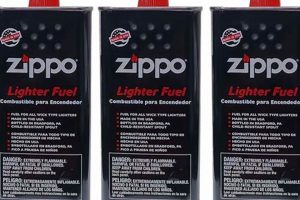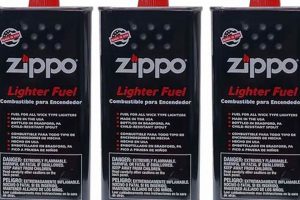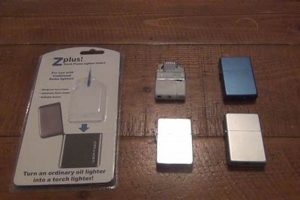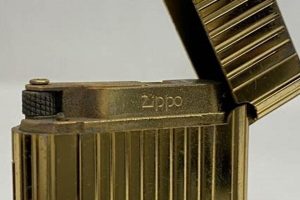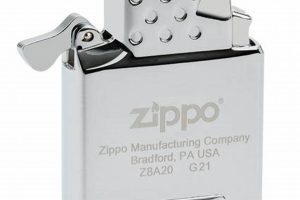Zippo lighters are designed for use with Zippo lighter fluid, a naphtha-based fuel. Ronson, and other brands, typically sell butane, a different type of fuel. While both fuels are flammable, their chemical properties and burning characteristics differ. Using butane in a Zippo lighter can lead to malfunctions, including inconsistent flames, difficulty igniting, and potential damage to the lighter’s components.
Using the correct fuel ensures the longevity and proper function of a Zippo lighter. Zippo’s design, including the wick and chimney, is optimized for naphtha’s specific burn rate and temperature. Attempting to substitute butane can compromise these carefully engineered elements, ultimately affecting the lighter’s reliability and potentially creating safety hazards. The appropriate fuel choice maximizes the lifespan of the lighter and maintains its intended performance.
Understanding the differences between these fuel types is essential for proper lighter maintenance and safe operation. Further exploration will cover the specific chemical properties of each fuel, the potential risks of using an incorrect fuel type, and recommendations for maintaining optimal lighter performance.
Tips for Proper Lighter Fuel Usage
Maintaining a lighter’s functionality and ensuring safe operation requires using the correct fuel type. These tips offer guidance on fuel selection and lighter maintenance.
Tip 1: Consult the Manufacturer’s Recommendations: Always refer to the manufacturer’s instructions for the specific fuel type recommended for a given lighter. This information is crucial for safe and optimal performance.
Tip 2: Understand Fuel Types: Different lighters are designed for specific fuels, such as naphtha or butane. Using the incorrect fuel can damage the lighter and create safety hazards.
Tip 3: Avoid Mixing Fuels: Never mix different fuel types. Combining fuels can lead to unpredictable burning characteristics and potential damage to the lighter.
Tip 4: Proper Filling Technique: Follow the manufacturer’s instructions for filling the lighter. Overfilling can create leaks and fire hazards.
Tip 5: Store Fuel Safely: Store lighter fuel in a cool, dry place away from heat sources and out of reach of children. Proper storage prevents accidents and maintains fuel quality.
Tip 6: Regular Lighter Maintenance: Periodically clean the lighter and replace worn-out components, such as flints and wicks, to ensure optimal performance and prevent malfunctions.
Adhering to these guidelines ensures the safe and efficient operation of a lighter, extending its lifespan and minimizing potential risks.
By understanding fuel compatibility and practicing proper lighter maintenance, users can enjoy a reliable and safe experience.
1. Fuel Type Mismatch
Fuel type mismatch is central to the question of using Ronson butane in a Zippo lighter. Zippo lighters are explicitly designed for Zippo premium lighter fluid, a naphtha-based fuel. Ronson fuel, commonly butane-based, presents a critical incompatibility issue. Understanding this mismatch is fundamental to ensuring safe and effective lighter operation.
- Chemical Properties and Combustion
Naphtha and butane exhibit different chemical properties influencing their combustion characteristics. Naphtha burns at a lower temperature and vaporizes more readily at room temperature. Butane, requiring higher pressure for storage in liquid form, burns hotter. These differences directly impact the lighter’s function, potentially leading to malfunctions or damage if an incompatible fuel is used.
- Lighter Design and Optimization
Zippo lighters are meticulously engineered for naphtha. The wick, chimney, and other internal components are designed for naphtha’s specific burn rate and temperature. Introducing butane disrupts this optimized system, potentially causing inconsistent flames, difficulty igniting, and damage to the lighter’s internal mechanisms.
- Safety Considerations
Using an incorrect fuel type can pose safety hazards. Butane’s higher burn temperature and pressure can stress Zippo components not designed for such conditions. This can lead to leaks, unpredictable flames, and potential fire risks. Using the correct fuel is essential for safe operation.
- Performance and Longevity
Fuel type directly impacts lighter performance and lifespan. Using the correct fuel ensures optimal combustion, consistent flame height, and reliable ignition. Using an incompatible fuel, like butane in a Zippo, compromises these performance aspects and potentially shortens the lighter’s lifespan.
The fuel type mismatch between Ronson butane and Zippo lighters underscores the importance of using the correct fuel. Attempting to use butane in a Zippo not only jeopardizes the lighter’s functionality and longevity but also introduces potential safety risks. Adhering to the manufacturer’s recommendations regarding fuel type is crucial for safe and optimal lighter performance. Continued use of the incorrect fuel will likely damage the lighter beyond repair.
2. Zippo requires naphtha
The statement “Zippo requires naphtha” is fundamental to understanding why Ronson butane, typically butane fuel, should not be used in a Zippo lighter. This requirement stems from the lighter’s design and the specific properties of naphtha. Zippo lighters utilize an open wick system optimized for naphtha’s volatility and burn temperature. This design facilitates easy ignition and a consistent flame. Naphtha’s lower vapor pressure allows for safe storage at ambient temperatures within the lighter’s reservoir. Attempting to use butane, which has a higher vapor pressure, introduces safety risks due to increased internal pressure and potential leaks. Furthermore, butane’s higher burn temperature can damage the wick and other components, compromising the lighter’s function and longevity.
Consider a real-world scenario: a user fills a Zippo lighter with butane. The higher vapor pressure can cause fuel leakage, creating a fire hazard. Upon ignition, the hotter-burning butane may scorch the wick and produce a sooty flame, unlike the clean burn expected with naphtha. Over time, continued use of butane can clog the wick and damage the lighter’s internal mechanisms, potentially rendering it unusable. This illustrates the practical importance of understanding the “Zippo requires naphtha” stipulation. It’s not merely a recommendation but a critical factor influencing safe and effective operation.
The incompatibility between Zippo lighters and butane fuel underscores the critical nature of using the correct fuel type. Ignoring this requirement compromises safety, degrades performance, and shortens the lighter’s lifespan. Choosing the correct fuel, in this case, naphtha, ensures the intended functionality and preserves the integrity of the lighter’s design. The “Zippo requires naphtha” statement directly answers the question “can you use Ronson butane in a Zippo” with a definitive “no,” protecting users from potential harm and ensuring optimal lighter performance.
3. Ronson typically butane
Understanding that Ronson fuel is typically butane-based is crucial when considering its compatibility with Zippo lighters. This distinction directly addresses the question of whether Ronson butane can be used in a Zippo, given the latter’s design specifically for naphtha fuel. The following facets explore the implications of this fuel type difference.
- Butane’s Properties and Storage
Butane’s physical properties necessitate pressurized storage. Unlike naphtha, which exists as a liquid at standard atmospheric pressure, butane requires higher pressure to maintain its liquid state within a lighter. Ronson’s utilization of butane reflects industry-standard practices for this fuel type, but this characteristic makes it unsuitable for Zippo lighters, which are not designed for pressurized fuel storage.
- Ronson’s Product Line and Intended Use
Ronson offers a range of lighters and fuels primarily designed for butane. These products are engineered with specific mechanisms and safety features compatible with butane’s properties. Using Ronson butane in a Zippo lighter designed for naphtha introduces a fundamental incompatibility, potentially damaging the lighter and creating safety hazards. Ronson’s intended use for its butane fuel underscores its unsuitability for Zippo lighters.
- Incompatibility with Zippo Design
Zippo lighters feature an open wick system optimized for naphtha’s lower vapor pressure and burning characteristics. Introducing butane, with its higher vapor pressure, disrupts this system. The higher pressure can stress the lighter’s seals, leading to leaks. Furthermore, butane’s higher burning temperature can damage the wick and other internal components, affecting performance and longevity.
- Safety Concerns and Potential Damage
Using Ronson butane in a Zippo poses safety risks due to the potential for fuel leaks and uncontrolled burning. The incompatibility between fuel type and lighter design can lead to unpredictable flames, damage to internal components, and potential fire hazards. These risks underscore the importance of using the correct fuel as specified by the manufacturer.
These facets highlight the inherent incompatibility between Ronson butane and Zippo lighters. Ronsons typical use of butane, while suitable for its own product line, creates significant issues when considering its use in a Zippo. The differences in fuel properties, storage requirements, and lighter design underscore the importance of adhering to manufacturer recommendations. Attempting to circumvent these guidelines by using Ronson butane in a Zippo not only compromises the lighter’s performance and lifespan but also introduces preventable safety risks.
4. Performance Issues
Performance issues directly link to the question of using Ronson butane, typically a butane fuel, in a Zippo lighter designed for naphtha. Using an incompatible fuel like butane in a Zippo lighter can lead to a range of performance problems stemming from the differences in fuel properties and the lighter’s design. These issues affect functionality, reliability, and the overall user experience.
One common performance issue is inconsistent flame height. Butane’s higher vapor pressure and different burn characteristics compared to naphtha can result in flames that are too high, too low, or erratic. This inconsistency makes the lighter unreliable for its intended purpose. Another frequent problem is difficulty igniting. The Zippo’s wick and chimney system are optimized for naphtha’s volatility. Butane’s different properties can hinder proper ignition, requiring multiple attempts or resulting in no flame at all. Furthermore, using butane can lead to a sooty flame, leaving residue on the lighter and potentially affecting the surrounding environment. Naphtha, by contrast, burns cleaner. Consider a scenario where a user attempts to light a candle in a dimly lit room. An inconsistent or nonexistent flame due to the use of butane creates inconvenience and frustration. In a survival situation, relying on a malfunctioning lighter due to improper fuel could have serious consequences.
These performance issues underscore the practical implications of using the correct fuel. A malfunctioning lighter not only diminishes its utility but can also pose safety hazards. The connection between “performance issues” and “can you use Ronson butane in a Zippo” is direct and significant. Understanding this connection empowers users to make informed decisions about fuel selection, ensuring reliable lighter performance and safe operation. Using the correct fuelnaphtha for a Zippo lighterprevents these performance problems and maintains the lighter’s intended functionality.
5. Potential Damage
Potential damage is a critical consideration when examining the use of Ronson butane, typically a butane fuel, in a Zippo lighter designed for naphtha. Using an incompatible fuel can compromise the lighter’s structural integrity, affecting its functionality and lifespan. This exploration delves into the specific types of damage that can occur, highlighting the importance of using the correct fuel.
- Wick Damage
Butane’s higher burn temperature can scorch and degrade the Zippo’s wick, designed for naphtha’s lower temperature. A damaged wick leads to inconsistent flames, difficulty igniting, and ultimately, lighter failure. Imagine a frayed and charred wick struggling to draw fuel, resulting in a weak, flickering flame or no flame at all. This damage necessitates wick replacement, impacting the lighter’s usability.
- Seal Degradation
Butane’s higher vapor pressure can stress the Zippo’s seals, designed to contain naphtha. Over time, this pressure can cause seals to crack or deteriorate, leading to fuel leaks. A leaking lighter not only poses a fire hazard but also renders the lighter unusable until repaired. Picture fuel slowly seeping from the lighter’s casing, creating a flammable risk and rendering the lighter inoperable.
- Clogging and Residue Buildup
Butane’s combustion byproducts can differ from those of naphtha. Using butane in a Zippo can lead to a buildup of residue and clog the lighter’s internal mechanisms, hindering fuel flow and ignition. This buildup can manifest as a sticky, black residue within the lighter’s casing, obstructing the workings and requiring thorough cleaning for restoration.
- Internal Component Damage
The higher temperature and pressure associated with butane combustion can damage sensitive internal components of a Zippo lighter not designed for such conditions. This can include the flint wheel mechanism, the hinge, and other vital parts. A damaged flint wheel, for instance, makes ignition difficult or impossible, rendering the lighter useless. Such damage often requires professional repair or replacement of the entire lighter.
These potential damages underscore the significant risks associated with using Ronson butane in a Zippo lighter. The incompatibility between the fuel and the lighter’s design creates a cascade of potential problems, ranging from minor performance issues to significant damage requiring repair or replacement. Understanding these risks reinforces the importance of using the correct fuelnaphthato maintain the Zippo’s functionality and prolong its lifespan. The connection between potential damage and the question “can you use Ronson butane in a Zippo” is clear and consequential. The answer, unequivocally, is no.
6. Safety Hazards
Safety hazards are paramount when considering the use of Ronson butane, a butane fuel, in a Zippo lighter designed for naphtha. Using an incompatible fuel introduces significant risks that can lead to fire, injury, and property damage. Understanding these hazards is crucial for responsible lighter use and safe handling of flammable materials. The following facets detail the specific safety risks associated with using butane in a Zippo lighter.
- Uncontrolled Flames and Fire Risk
Butane’s higher vapor pressure and different burn characteristics in a Zippo lighter not designed for it can produce unpredictable flames, significantly increasing the risk of uncontrolled fire. The flame may be larger than expected, erratic, or prone to flaring, potentially igniting nearby flammable materials. Imagine attempting to light a cigarette near loose clothing or paper; an unexpected flare-up could easily ignite these materials, leading to burns or a larger fire. This risk underscores the importance of using the correct fuel to maintain predictable and controlled flames.
- Fuel Leakage and Flammability
Using butane in a Zippo can stress the lighter’s seals, designed for naphtha’s lower vapor pressure. This can lead to fuel leakage, creating a highly flammable environment. Leaked butane can readily ignite from a spark, flame, or even static electricity, causing a sudden and potentially dangerous fire. Visualize butane leaking onto a table surface; a stray spark from an electrical appliance could ignite the pooled fuel, leading to a rapid fire spread. This highlights the importance of using compatible fuels to prevent leaks and maintain a safe environment.
- Lighter Explosions or Ruptures
Although rare, using butane in a Zippo can increase the risk of lighter explosion or rupture due to the pressure differential. The lighter’s casing isn’t designed to withstand the higher vapor pressure of butane, potentially leading to structural failure under stress, particularly in warmer environments. Consider a lighter left in direct sunlight on a hot day; the increased pressure from the expanding butane could exceed the lighter’s structural limits, causing a rupture or explosion. This risk, though infrequent, underscores the importance of using the correct fuel to prevent overpressurization.
- Burns and Injuries
The unpredictable flames and potential for leakage associated with using butane in a Zippo increase the risk of burns and other injuries. An unexpected flare-up can cause burns to hands, face, or clothing. Leaked fuel can ignite and cause more extensive burns or fire-related injuries. Consider a scenario where leaked butane ignites unexpectedly while refueling the lighter; this could result in serious burns to the hands and face. Using the correct fuel minimizes these risks by ensuring predictable flame behavior and preventing leaks.
These safety hazards directly address the core question of “can you use Ronson butane in a Zippo?” The clear answer is no. The risks associated with using an incompatible fuel like butane in a Zippo lighter are significant and can lead to serious consequences. Prioritizing safety by using the correct fuelnaphthais paramount for responsible lighter use and the prevention of accidents. Ignoring these safety precautions increases the likelihood of fire, injury, and property damage. Proper fuel selection is not merely a recommendation but a critical safety imperative.
7. Consult Manufacturer Guidelines
Consulting manufacturer guidelines is paramount when considering fuel compatibility for any device, especially flammable-fuel-dependent devices like lighters. The question “can you use Ronson butane in a Zippo” hinges directly on this principle. Zippo explicitly states that its lighters are designed for Zippo premium lighter fluid, a naphtha-based fuel. Ronson fuels are typically butane. Disregarding manufacturer guidelines and using butane in a Zippo introduces significant risks, including performance issues, damage to the lighter, and potential safety hazards. The cause-and-effect relationship is clear: ignoring explicit instructions leads to negative consequences.
Consider a hypothetical scenario: a user unfamiliar with fuel types attempts to fill a Zippo with Ronson butane. The lighter may initially function, albeit erratically. However, continued use can damage the wick, clog internal mechanisms, and potentially lead to fuel leaks. The user, unaware of the incompatibility, might attribute these issues to a faulty lighter rather than the incorrect fuel. This example demonstrates the practical significance of consulting manufacturer guidelines. Had the user referred to the Zippo instructions, they would have avoided these problems and ensured safe and optimal lighter performance. Another real-world example involves warranties. Using an incompatible fuel voids the Zippo warranty. Consulting the guidelines prevents unintentional forfeiture of warranty coverage.
Manufacturer guidelines are not arbitrary restrictions but crucial instructions based on design specifications and safety considerations. In the context of “can you use Ronson butane in a Zippo,” consulting these guidelines provides a definitive answer: no. This seemingly simple act of checking instructions prevents potential harm, ensures optimal product performance, and reinforces the importance of respecting manufacturer recommendations. The connection between consulting guidelines and responsible lighter use is undeniable. It empowers users to make informed decisions, mitigating risks and ensuring the safe and effective operation of their lighters.
Frequently Asked Questions
This FAQ section addresses common inquiries regarding fuel compatibility with Zippo lighters, specifically focusing on the use of butane fuel and potential alternatives.
Question 1: What type of fuel is recommended for Zippo lighters?
Zippo lighters are designed exclusively for Zippo premium lighter fluid, a naphtha-based fuel. Using any other fuel type can void the warranty, compromise performance, and pose safety hazards.
Question 2: Can butane fuel, such as Ronson, be used in a Zippo lighter?
No. Butane fuel is not compatible with Zippo lighters. Using butane can damage the lighter’s internal components, create performance issues, and increase the risk of fire and injury.
Question 3: What are the risks of using an incompatible fuel in a Zippo lighter?
Using incompatible fuels can lead to inconsistent flames, difficulty igniting, fuel leaks, damage to the wick and other components, and potentially even fire or explosion.
Question 4: Are there any alternatives to Zippo premium lighter fluid?
While other naphtha-based lighter fluids might seem similar, using anything other than Zippo premium lighter fluid is not recommended and can negatively impact performance and longevity.
Question 5: Where can authentic Zippo premium lighter fluid be purchased?
Authentic Zippo premium lighter fluid can be purchased from authorized retailers, including tobacco shops, convenience stores, and online marketplaces. Ensure the product packaging displays the official Zippo branding to avoid counterfeit products.
Question 6: What should be done if an incompatible fuel is accidentally used in a Zippo?
If an incompatible fuel is used, purge the lighter immediately. Consult Zippo’s official website or contact customer service for further instructions on cleaning and restoring the lighter. Professional repair may be necessary.
Using the correct fuel is essential for safe and optimal lighter performance. Always consult the manufacturer’s guidelines and use only the recommended fuel type.
For further information and detailed instructions, refer to the official Zippo website.
Conclusion
Compatibility between fuel and lighter design is crucial for safe and optimal function. The exploration of using Ronson butane in a Zippo lighter reveals a fundamental incompatibility. Zippo lighters are engineered for naphtha-based fuel, specifically Zippo premium lighter fluid. Ronson fuel, typically butane, differs significantly in its chemical properties, storage requirements, and burning characteristics. Attempting to use butane in a Zippo lighter risks performance issues, internal damage, and potential safety hazards, including uncontrolled flames and fuel leaks. Manufacturer guidelines emphasize this incompatibility, recommending only Zippo premium lighter fluid for optimal performance and longevity.
Prioritizing safety and functionality requires adherence to manufacturer specifications. Using the correct fuel is not merely a suggestion but a critical factor in ensuring a lighter’s safe and effective operation. Disregarding these guidelines compromises the lighter’s intended performance and introduces preventable risks. Choosing the appropriate fuel ensures reliable operation and mitigates potential hazards associated with incompatible fuel use. Ultimately, responsible lighter ownership necessitates informed fuel selection based on manufacturer recommendations.


